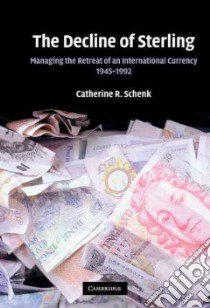- Libreria
- >
- Libri in lingua
- >
- Storia e archeologia
- >
- Storia
The Decline of Sterling - 9780521876971
Un libro in lingua di Schenk Catherine R. edito da Cambridge Univ Pr, 2010
- € 111.30
- Il prezzo è variabile in funzione del cambio della valuta d’origine
`Catherine Schenk tells the story of the changing fortunes of sterling across the second half of the twentieth century. This ranges over everything from convertibility, reserve currencies, sterling balances, the euro-currency markets, the international financial architecture, and a great deal more. Sterling has also been placed in the context of the international monetary system, and in the context of the growing literature on the economic and wider history of the period. It is an excellent account of difficult territory.'
Forrest capie, Professor of Economic History at Cass Business School and offical Historian of the Bank of England
`Anyone concerned about how to resolve the global imbalances in the international economy today needs to read Catherine Schenk's detailed study of the political and economic difficulties that bedevilled Britain's decades-long effort to eliminate the "sterling problem" left over from World war 11. Her detailed analysis of the issues that confronted British policymakers and how they were resolved shows how hard it is to correct global imbalances once they exist, even with the best of intentions and international cooperation. For, even if the stakes diminish overtime, as they did with British sterling, the stake holders and their interests keep changing as well'
LARRY NEAL, Emeritus Professor of Economics at the University of Illinois at Urbana-Champaign
The demise of sterling as an international currency was widely predicted after 1945, but the process took thirty years to complete. why was this demise so prolonged?Traditional explanations have emphasised the British effort to prolong sterling's role on the grounds that it either increased the capacity to borrow, enhanced prestige or supported London as a centre for international finance. This book challenges this view by arguing that sterling's international role was prolonged by the weakness of the international monetary system and by collective global interest in its continuation. Using the archives of partner countries in Europe, the United States and the Commonwealth, Catherine R. Schenk shows how the United Kingdom was able to convince other governments that sterling's international role was critical for the stability of the international economy and thereby attract considerable support for managing its retreat. This revised view has important implications for current debates over the future of the US dollar as an international currency.
Informazioni bibliografiche
- Titolo del Libro in lingua: The Decline of Sterling
- Sottotitolo: Managing the Retreat of an International Currency, 1945-1992
- Lingua: English
- Autore: Schenk Catherine R.
- Editore: Cambridge Univ Pr
- Collana: Cambridge Univ Pr (Hardcover)
- Data di Pubblicazione: 05 Luglio '10
- Genere: BUSINESS and ECONOMICS
- Argomenti : Pound, British History 20th century Monetary policy Great Britain History 20th century International economic relations History 20th century
- Pagine: 437
- ISBN-10: 0521876974
- EAN-13: 9780521876971


